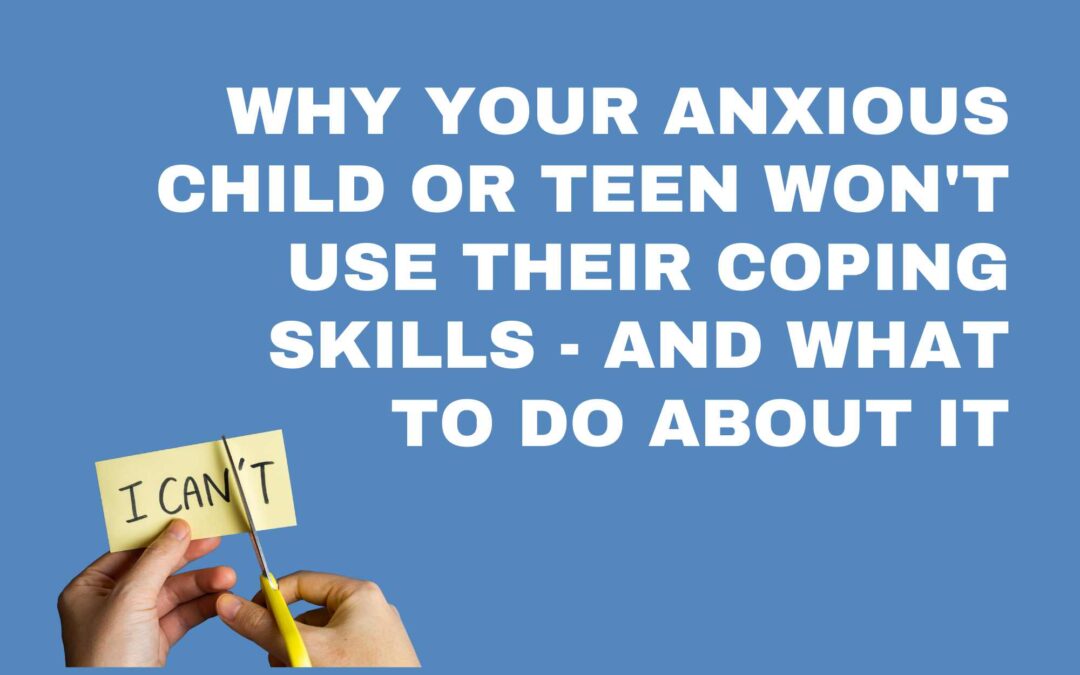One of the most frustrating aspects of raising a child with anxiety is that, often, even when they have been taught skills, they won’t always use them. In fact, I may be so bold as to say that they will rarely use them. This creates a challenging situation for both parents and their child/teen, leading to power struggles, frustration, and a sense of helplessness.
“If my child won’t even use their skills, what’s the point? How do I get them to actually use what they have learned?” one parent asked me in a recent session.
It’s a great question and one that deserves a deeper look.
If your child or teen is refusing to use strategies, it may be because:
- They are in the downstairs brain, and this isn’t even possible for them.
- They haven’t been taught the skills in a way where they actually know how to practice them.
- They don’t think the skills are going to work.
- They feel minimized.
- They are extrinsically motivated toward change and not intrinsically motivated.
Let’s break down each of these reasons to help you make decisions about how you may be able to make some shifts to increase your child or teen’s willingness to try a coping skill.
1. They are in the downstairs brain, and this isn’t even possible for them.
It’s important to know that when anyone is triggered at a high level, their brain functioning literally shifts away from what Dr. Dan Siegel and Dr. Tina Bryson call the “upstairs” brain and into the “downstairs” brain. This part of your brain is all about survival and relief. If you are in the “downstairs” brain, you cannot even access the files that are in the “upstairs” brain. The “upstairs” brain is responsible for more complex thinking, problem-solving, insight, creativity, and logic (i.e., using coping skills).
Knowing this can help you adjust your expectation that your child or teen should even be able to use skills. Next time your child is triggered, ask yourself, “Are they upstairs or downstairs?” and act accordingly.
So, what if they ARE downstairs? What do you do? To ease your child back into the “upstairs” part of their brains, try using your connection to them and your relationship with them to offer support:
- Listen and validate their feelings with words and body language.
- Offer to sit with them while you wait out the feelings together.
- Offer some physical touch; a hug or rubbing their back are good options if they are receptive.
- Offer once to help them with a body-focused skill that they already know (movement, breathing, muscle relaxation) and accept their answer if it’s ‘no’.
What NOT to do:
- Offer solutions.
- Ask more than once to talk about their feelings.
- Remind them more than once about skills they can use.
2. They haven’t been taught the skills in a way where they actually know how to practice them (or what they even are).
In order for someone to truly be able to use a coping skill, they need to have been practicing it. It’s unlikely that a child or teen being told about a skill or practicing it once a few months ago is going to lead to action in-the-moment of anxiety. Kids and teens need help to know skills and practice these skills. Ask your child or teen what their top three coping skills are for anxious moments; if they stumble or have no idea, it’s likely that their knowledge of what to do and how to do it is significantly lacking.
Use our upcoming skill library within our anxiety course that will be launched on February 5th to identify what their go-to skills will be and create a plan to practice them. For more information on the launch of this course, sign up for our email list: www.calmmindcbt.com/weeklyemail
3. They don’t think the skills are going to work.
Recently, I was using a skill with my own child when he was frustrated and anxious about something. After we practiced the skill, he looked up at me and said, “I still feel frustrated and anxious.” His expectation was that we were going to use this skill and he would not feel these emotions anymore. What a disappointment to him that it didn’t ‘work’.
We can all relate to this, and it’s a common sentiment. “Isn’t this supposed to make me feel better?” The answer is yes AND no. Using skills can sometimes turn down the volume of anxiety, but not always. In fact, the goal of using skills isn’t even to get rid of anxiety; it is to be able to adjust our nervous system slightly so we can accept difficult emotions, problem-solve if needed, and continue to live the life that we want…even WITH anxious emotions. When a child or teen truly expects that a skill is supposed to make them ‘feel better,’ they are often disappointed and less likely to want to use the skill in the future.
In order to tackle this, after using a skill do NOT ask, “Do you feel better?”. Instead, say, “I am so impressed you were able to use a skill; that’s not always easy to do. What do you want to do next?”
In moments of calm, teach your child or teen that skills sometimes help with turning down the volume of anxiety. Also teach them that we use skills as a way to take care of our bodies when they are really stressed and be able to choose what WE want to do next, not what ANXIETY wants us to do next. Skills don’t always turn down the volume of anxiety and they are STILL working.
In addition, it’s so important to experiment with different skills and find the ones that your child or teen actually likes and work for them. Again, our course launching February 5th will have a video library of skills that can be experimented with to find the ones that your child says they will actually be willing to try. If it doesn’t work or feel good to them when they try it, scrap it and try another one!
4. They feel minimized.
Imagine that you are really anxious about a presentation you are giving in an hour. You aren’t sure if you prepared well enough and keep picturing yourself being laughed off the stage. Next, imagine someone close to you telling you to ‘just use some of your skills’. It might not feel very supportive, and you may think that this person just doesn’t ‘get it’.
If a person doesn’t feel understood, they are more likely to reject a reminder of a skill. They may even up the ante to prove to you that their suffering is beyond the use of a ‘skill’. The way to overcome this is to NEVER jump to reminding your child to use a skill right away. Always start with validating them and ASK them if they would like to be reminded of some of their skills that might ‘turn the volume down’ just a bit.
You might say:
“I can see how anxious you are feeling. That’s really hard. I hate it when those emotions come up for me, so I really feel for you. I’d be happy to sit with you for a while if you’d like. If you want, I could also remind you of some of the skills you have to try. I know they might not make this go away, but maybe could turn down the volume just a smidge to help you through this?”
Accept their answer if it’s ‘no’. Ultimately, forcing or creating any kind of pressure to use skills WILL backfire. Kids and teens MUST be able to make their own decisions about using skills. It may take some time, but this patience with allowing them to choose can absolutely lead to them being willing to try something out one day.
5. They are extrinsically motivated toward change and not intrinsically motivated.
When someone who is struggling with anxiety is getting pressure to feel better, use skills, or just do ‘the thing,’ it can be a huge deflator of motivation. Being motivated intrinsically, or for reasons that are within yourself, is exponentially more powerful than being motivated by what others may want or external factors like grades or fears of social repercussions. While it may seem that external motivators should be helpful, and they certainly can be at times, when someone is motivated toward change because it’s what THEY truly want within themselves, effort will come much more readily.
To help increase intrinsic motivation in your child or teen:
- Ask them what is important to them in terms of their anxiety problem being resolved—and honor that.
- Ask them IF and HOW they want to be reminded of strategies when they are anxious—and honor that.
- Gently and with deep warmth point out things they may be missing out on because of anxiety (social events, peace of mind, free time, sleep).
Remember that change doesn’t happen from one or two conversations. Gentle conversations that honor their wishes can slowly lead to more and more willingness to try new things toward change.
There are many reasons that your child or teen isn’t using their skills. Identify the primary reasons that may be coming up for them and experiment with different ways to make changes to address the stuck points.

